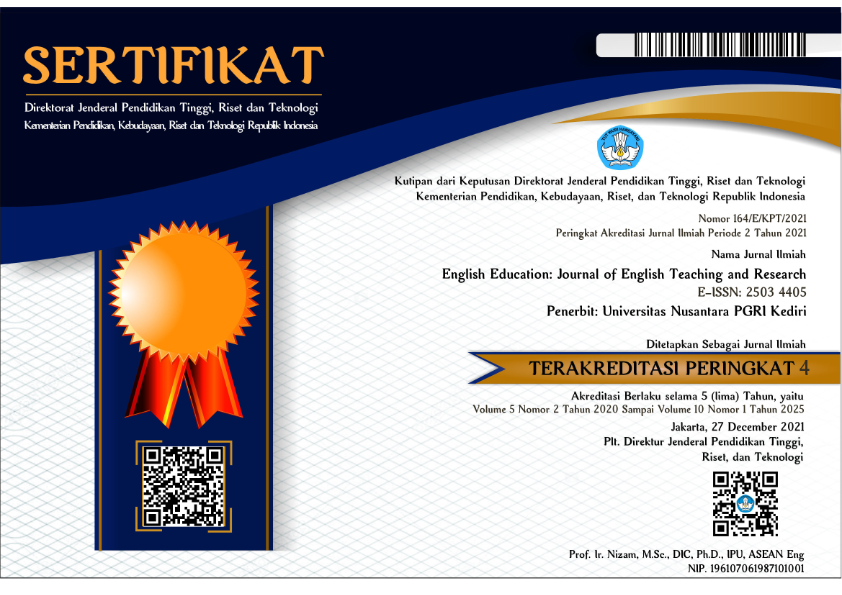English Teaching Based-Strategy LMS Moodle and Google Classroom
Feature of Testing and Feedback
DOI:
https://doi.org/10.29407/jetar.v6i1.15622Keywords:
English Teaching Method, Google Classroom, LMS Moodle, Testing Language, Feedback Testing LanguageAbstract
Teaching English Foreign Language (TEFL) has shifted complex for developing countries, especially Indonesia. Pandemic conditions bound conventional face-to-face teaching. A virtual classroom is another way of implementing the learning and teaching process. The purpose study investigates and describes the selection of English teaching based-strategy LMS Moodle and Google Classroom, particularly the testing and feedback feature. The qualitative research approached grounded theory. The entire data was collected by the questioner using purposeful sampling. The testing teaching strategies LMS Moodle discovered multiple-choice, short answer, essay, true/false statement, and missing word. Even though testing teaching strategies, Google Classroom was found multiple-choice, short answer, and essay. The selection of assessments is one of the benchmarks for English lecturers' readiness to teach using Moodle and Google classroom media. The testing variety is capable of encouraging students to perform well in e-learning. Feedback selection classifications were discovered, formal feedback, formative feedback, and summative feedback. Formal feedback is designed and regularly scheduled for the process. Formal feedback is designed and regularly scheduled for the process. The formative feedback is to observe student learning to provide continuous feedback. The summative testing evaluates student learning at the end of an instructional unit by comparing it against some patterns
Downloads
References
Abou El-Seoud, M., Taj-Eddin, I., Seddiek, N., El-Khouly, M., & Nosseir, A. (2014). E-learning and students' motivation: A research study on the effect of e-learning on higher education. International journal of emerging technologies in learning (iJET), 9(4), 20-26.
Adnan, M., & Anwar, K. (2020). Online Learning amid the COVID-19 Pandemic: Students' Perspectives. Online Submission, 2(1), 45-51.
Albashtawi, A., & Al Bataineh, K. (2020). The effectiveness of google classroom among EFL students in Jordan: an innovative teaching and learning online platform. International Journal of Emerging Technologies in Learning (IJET), 15(11), 78-88.
Ali, A. D. (2016). Effectiveness of Using Screencast Feedback on EFL Students' Writing and Perception. English Language Teaching, 9(8), 106-121.
Altun, M. (2015). The integration of technology into foreign language teaching. International Journal on New Trends in Education and Their Implications, 6(1), 22-27.
Amaral, L. A., & Meurers, D. (2011). On using intelligent computer-assisted language learning in real-life foreign language teaching and learning. ReCALL, 23(1), 4-24.
Barman, B., & Karthikeyan, J. (2019). Facilitating ELT through Moodle and Google Classroom. Restaurant Business, 118(10), 506-518.
Bošković, V., Gajić, T., & Tomić, I. (2014). Moodle in English language teaching. ImpaCt of Internet on BUSIneSS aCtIvItIeS In SerBIa and WorldWIde, 480.
Chaikina, Z. V., Shevchenko, S. M., Mukhina, M. V., Katkova, O. V., & Kutepova, L. I. (2017, July). Electronic testing as a tool for optimizing the process of control over the results of educational training activities. In International conference on Humans as an
Object of Study by Modern Science (pp. 194-200). Springer, Cham.
Derakhshan, Ali & Salehi, Danial & Rahimzadeh, Mahboubeh. (2015). Computer-Assisted Language Learning (Call): Pedagogical Pros and Cons. International Journal of English Language and Literature Studies. 4. 111-120. 10.18488/journal.23/2015.4.3/23.3.111.120.
Dhawan, S. (2020). Online learning: A panacea in the time of COVID-19 crisis. Journal of Educational Technology Systems, 49(1), 5-22.
Gass, S. M. & A. Mackey (2015). Input, interaction, and output in second language acquisition. In B. VanPatten & J.Williams (eds.), Theories in second language acquisition (2nd edn.). New York: Routledge, 180–206.
Gillett-Swan, Jenna. (2017). The Challenges of Online Learning: Supporting and Engaging the Isolated Learner. Journal of Learning Design. 10. 20. 10.5204/jld.v9i3.293.
Harris, K. L. (2016). Reflexive voicing: A communicative approach to intersectional writing. Qualitative Research, 16(1), 111-127.
Iftakhar, S. (2016). Google classroom: what works and how. Journal of Education and Social Sciences, 3(1), 12-18.
Iftakhar, S. (2016). Google classroom: what works and how. Journal of Education and Social Sciences, 3(1), 12-18.
Jing, M. A. (2016). The application of Moodle-based platform in college English learning. Sino-US English Teaching, 13(5), 332-337.
Kapsargina, S., & Olentsova, J. (2020, March). Reasonability of using LMS Moodle tests as a form of control in teaching a foreign language for students of secondary vocational education. In "New Silk Road: Business Cooperation and Prospective of Economic Development" (NSRBCPED 2019) (pp. 811-815). Atlantis Press.
Kessler, G. (2018). Technology and the future of language teaching. Foreign Language Annals, 51(1), 205-218.
Makhmudov, K. (2020). Ways of Forming Intercultural Communication in Foreign Language Teaching. Science and Education, 1(4).
Marcellino, M. (2015). English language teaching in Indonesia: A continuous challenge in education and cultural diversity. TEFLIN journal, 19(1), 57-69.
Melton, J. (2006). The LMS Moodle: A usability evaluation. Prefectural University of Kumamoto. Retrieved February, 21, 2008.
Moeller, Aleidine Kramer and Catalano, Theresa, "Foreign Language Teaching and Learning" (2015). Faculty Publications: Department of Teaching, Learning and Teacher Education. 200.
Qu, W., & Zhang, C. (2013). The analysis of summative assessment and formative assessment and their roles in college English assessment system. Journal of Language Teaching and Research, 4(2), 335.
Rahman, M. S. (2020). The advantages and disadvantages of using qualitative and quantitative approaches and methods in language "testing and assessment" research: A literature review.
Ramak, M., & Ziabari, S. R.(2017) Computer Assisted Language Testing Benefits, Constraints and Future Directions. Research Journal of English Language and Literature (RJELAL). 336-342
Rana, H., & Lal, M. (2014). E-learning: Issues and challenges. International Journal of Computer Applications, 97(5).
Richards, J. C. (2017). Teaching English through English: Proficiency, pedagogy and performance. RELC Journal, 48(1), 7-30.
Saefurrohman, S., & Balinas, E. S. (2016). English teachers classroom assessment practices. International Journal of Evaluation and Research in Education (IJERE), 5(1), 82-92.
Shilova, T. V., Artamonova, L. V., & Averina, S. Y. (2014). Computer-based Tests as an Integral Component of an EFL Course in Moodle for Non-linguistic Students. Procedia-Social and Behavioral Sciences, 154, 434-436.
Sumtsova, O., Aikina, T., Bolsunovskaya, L., Phillips, C., Zubkova, O., & Mitchell, P. (2018). Collaborative learning at engineering universities: Benefits and challenges. International Journal of Emerging Technologies in Learning (iJET), 13(1), 160-177.
Syakur, A. (2020). The Effectiveness of English Learning Media through Google Classroom in Higher Education. Britain International of Linguistics Arts and Education (BIoLAE) Journal, 2(1), 475-483.
V Butova, A., I Dubskikh, A., Kisel, O. V., & G Chigintseva, E. (2019). Electronic educational environment Moodle in English language training. Arab World English Journal (AWEJ) Volume, 10.
Vasanth, S., & Sumathi, C. S. (2020). Learning management systems through Moodle and Google classroom for education. Advances in Research, 32-37.
Vattøy, K. D. (2020). Teachers' beliefs about feedback practice as related to student self-regulation, self-efficacy, and language skills in teaching English as a foreign language. Studies in Educational Evaluation, 64, 100828.
Yang, C. (2018). A formalist perspective on language acquisition. Linguistic Approaches to Bilingualism, 8(6), 665-706.
Downloads
Published
Issue
Section
License
Authors who publish with this journal agree to the following terms:
- Copyright on any article is retained by the author(s).
- The author grants the journal, the right of first publication with the work simultaneously licensed under a Creative Commons Attribution License that allows others to share the work with an acknowledgment of the work’s authorship and initial publication in this journal.
- Authors are able to enter into separate, additional contractual arrangements for the non-exclusive distribution of the journal’s published version of the work (e.g., post it to an institutional repository or publish it in a book), with an acknowledgment of its initial publication in this journal.
- Authors are permitted and encouraged to post their work online (e.g., in institutional repositories or on their website) prior to and during the submission process, as it can lead to productive exchanges, as well as earlier and greater citation of published work.
- The article and any associated published material is distributed under the Creative Commons Attribution-ShareAlike 4.0 International License








 Article template
Article template



